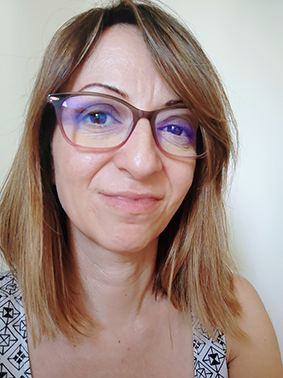
Our scientific aim has been the development of translational approaches for the treatment of neurodegenerative diseases, brain infection, and neurotrauma, being particularly interested in neuron-glia interactions. We implement animal and in vitro models of neuropathology and neuroregeneration integrating ex vivo and in vivo gene therapy and cell transplantation, bioimaging, molecular biology, cell culture, and biochemistry. Recently, we have incorporated in our studies cell reprogramming technologies, using neural cells derived from human induced pluripotent stem cells (iPSC) to model human neural development and disease in vitro. These projects are running in the Institute’s Human Embryonic and Induced Pluripotent Stem Cell Unit.
The role of astrocytes in Parkinson’s Disease (PD)
Parkinson’s disease (PD) and related synucleinopathies are a group of incurable neurodegenerative disorders associated with alpha-synuclein (αSyn) pathology. Most published work, including ours (Kouroupi et al., 2017 PNAS, doi: 10.1073/pnas.1617259114), has focused on neuron-intrinsic dysfunction while the role of other cell types has only started being examined. Astrocytes, the most abundant cells in the human brain, play a critical role in maintaining neuronal health, yet their neurotoxic potential is now being appreciated and could contribute to disease pathology through neuroinflammatory mechanisms, a consistent PD feature. In our recently launched project, we have employed our well established disease-in-a-dish model of aSyn-PD patient-derived induced pluripotent stem cells (iPSC) to generate human astrocytes and investigate their contribution in already known PD phenotypes but also potentially discover new neurotoxic or neuroprotective mechanisms in monocultures and in co-cultures with aSyn-PD-patient iPSC-derived neurons. The project aims at implementing high-throughput phenotypic screens to determine disease mechanisms and druggable targets in patient-derived cells.
Members involved
R. Matsas, E. Taoufik, K. Harbi, O. Apokotou, A. Kollias, C. Paschou.
Funding
HFRI 1019 “DiseasePhenoTarget” 2021-2024 to R. Matsas.
Microbes and Brain (collaboration with Institut Pasteur Paris)
The brain is exposed to pathogens that can cross its protective barriers and infect host cells. Recent data show that infection and associated inflammation can affect neural stem cells (NSC) and their supporting niche, leading to impaired neurogenesis. In a collaborative project with Dr P. Speder and Dr S. Dramsi in Institut Pasteur Paris we have been studying (A) the mechanisms of BBB crossing by Streptococcus agalactiae (Group B Streptococcus, the major pathogen causing meningitis in newborns, the elderly and immunocompromised subjects) and (B) the pathways activated in the NSC niche during infection affecting neurogenesis, in a hematogenous model of mouse brain infection.
Members involved
R. Matsas [PI], P. Miriagou (Bacteriology, HPI), A. Segklia [post-doc], S. Trigoni, D. Dionysopoulou, T. Asimi [students]
Funding
Grand Programme Fédérateur Microbes & Brain Project 2017-2019 to R. Matsas, P. Speder, S. Dramsi.
Relevant publication
Benmimoun B, Papastefanaki F, et al., Nat Commun. 2020. doi: 10.1038/s41467-020-19826-2.
Hellenic Foundation for Research and Innovation (HFRI) 2021-2024: Development of a multiparametric morphofunctional platform to uncover disease mechanisms and druggable targets in patient derived cells: study of neuron-glia dynamics in alpha synuclein-mediated pathologies» (1019-DiseasePHENOTarget). PI: R. Matsas (FP participates as WP leader)
Hellenic General Secretariat for Research and Innovation (GSRI) Operational Programme Competitiveness, Entrepreneurship and Innovation 2014-2020 (EPAnEK – NSRF 2014-2020), 2021-2023: Systematic development and commercial exploitation of novel compounds inhibiting alpha-synuclein aggregation ( AlphaSyn MIS 5131418) PI for HPI: R. Matsas; Coordinator: G. Skretas (FP participates as team member)
Hellenic Foundation for Research and Innovation (HFRI) Project for Postdoctoral Researchers 2018-2021: Mechanisms of synaptic dysfunction in human induced pluripotent stem cell-based 2D- and 3D-models of familial Parkinson’s disease (PARKINSynapse). Principal Investigator: G. Kouroupi (FP participates as team member)
Institut Pasteur Direction du Développement, GRAND PROGRAMME FÉDÉRATEUR M&B, MICROBES & BRAIN PROJECTS 2016: SEEDS FOR INNOVATION 2017-2018: In vivo models of brain infection by Gram+ bacteria: from barrier crossing to neural stem cell (InFeSteR). PIs: Pauline Spéder-Murphy (coordinator); Shaynoor Dramsi; Rebecca Matsas. (FP participates as team member)
«Infectious, autoimmune and neurodegenerative diseases: study of the pathogenetic mechanisms and development of diagnostic, prognostic and therapeutic approaches» (MIS 5002486) Implemented under the «Action Strategic Development on the Research and Technological Sector» funded by the Operational Program «Competitiveness, Entrepreneurship and Innovation» (NSFR 2014-2020), and co-financed by the Greek State and the European Regional Development Fund, for the period Oct. 2017* – Sept. 2019. (Coordination: E. Karagouni, Institutional project) – (FP participates as WP leader)
Institut Pasteur Transversal Research Program 2015-2018 PTR-523: Mechanisms of pathological A53T-alpha-synuclein transmission in human iPS-derived neurons. Coordinated by R. Matsas; Participants: C. Zurzolo, PM Lledo and F. Lazarini IP-Paris (FP participates as team member)
2017: Travel grant to attend the 2nd Croucher course on Advanced Imaging in Hong Kong.
2016: EMBO travel grant to attend the EMBO Workshop on Dendritic Anatomy, Molecules and Function
2013: Research Fellowship from the Theodore-Theochari Cozzika Foundation
2012: EMBO Short Term Fellowship to visit Mellita Schachner lab, Hamburg, Germany
Athens International Master’s Programme in Neurosciences launched in 2017 as part of the Network of European Neuroscience Schools (NENS).
“MA Animal Welfare, Ethics and the Law”, Department of Philosophy (NKUA) and the Hellenic Pasteur Institute
Kouroupi G, Prodromidou K, Papastefanaki F, Taoufik E, Matsas R. Organoids: the third dimension of human brain development and disease. Int J Dev Biol. 2022;66(1-2-3):23-33. doi: 10.1387/ijdb.210158gk. PMID: 34881786.
Papastefanaki F. Application of developmental principles for spinal cord repair after injury. Int J Dev Biol. 2022;66(1-2-3):125-135. doi: 10.1387/ijdb.210110fp. PMID: 34549790.
Benmimoun B, Papastefanaki F, Périchon B, Segklia K, Roby N, Miriagou V, Schmitt C, Dramsi S, Matsas R, Spéder P. An original infection model identifies host lipoprotein import as a route for blood-brain barrier crossing. Nat Commun. 2020 Nov 30;11(1):6106. doi: 10.1038/s41467-020-19826-2. PMID: 33257684; PMCID: PMC7704634.
Kouroupi G, Taoufik E, Vlachos IS, Tsioras K, Antoniou N, Papastefanaki F, Chroni-Tzartou D, Wrasidlo W, Bohl D, Stellas D, Politis PK, Vekrellis K, Papadimitriou D, Stefanis L, Bregestovski P, Hatzigeorgiou AG, Masliah E, Matsas R. Defective synaptic connectivity and axonal neuropathology in a human iPSC- based model of familial Parkinson's disease. Proc Natl Acad Sci U S A. 2017 May 2;114(18):E3679-E3688. doi: 10.1073/pnas.1617259114. Epub 2017 Apr 17. PMID: 28416701; PMCID: PMC5422768.
Sofia Dede (MSc thesis student 2022-2023)
Olympia Apokotou (Staff Scientist [Human Stem Cell Unit] 2021-)
